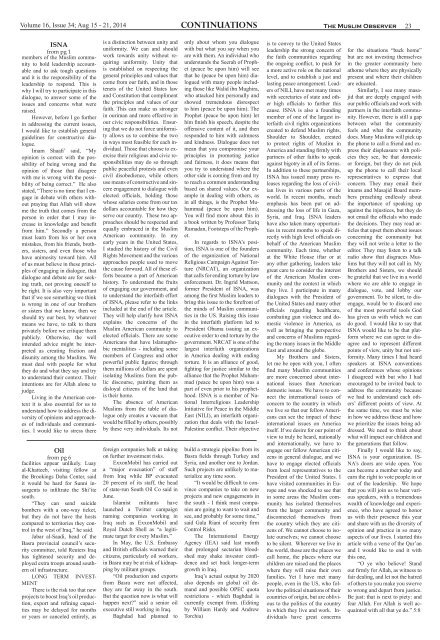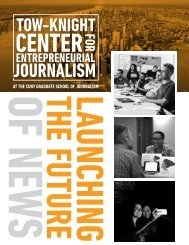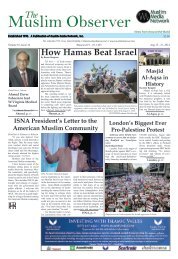Muslim Observer
You also want an ePaper? Increase the reach of your titles
YUMPU automatically turns print PDFs into web optimized ePapers that Google loves.
Volume 16, Issue 34; Aug 15 - 21, 2014<br />
continuations<br />
The <strong>Muslim</strong> <strong>Observer</strong><br />
23<br />
ISNA<br />
from pg 1<br />
members of the <strong>Muslim</strong> community<br />
to hold leadership accountable<br />
and to ask tough questions<br />
and it is the responsibility of the<br />
leadership to respond. This is<br />
why I will try to participate in this<br />
dialogue, to answer some of the<br />
issues and concerns what were<br />
raised.<br />
However, before I go further<br />
in addressing the current issues,<br />
I would like to establish general<br />
guidelines for constructive dialogue.<br />
Imam Shaafi’ said, “My<br />
opinion is correct with the possibility<br />
of being wrong and the<br />
opinion of those that disagree<br />
with me is wrong with the possibility<br />
of being correct.” He also<br />
stated, “There is no time that I engage<br />
in debate with others without<br />
praying that Allah will show<br />
me the truth that comes from the<br />
person in order that I may increase<br />
in knowledge and benefit<br />
from him.” Secondly a person<br />
must learn from his or her own<br />
mistakes, from his friends, brothers,<br />
sisters, and even those who<br />
have animosity toward him. All<br />
of us must believe in these principles<br />
of engaging in dialogue, that<br />
dialogue and debate are for seeking<br />
truth, not proving oneself to<br />
be right. It is also very important<br />
that if we see something we think<br />
is wrong in one of our brothers<br />
or sisters that we know, then we<br />
should try our best, by whatever<br />
means we have, to talk to them<br />
privately before we critique them<br />
publicly. Otherwise, the well<br />
intended advice might be interpreted<br />
as creating friction and<br />
disunity among the <strong>Muslim</strong>s. We<br />
must deal with people for what<br />
they do and what they say and try<br />
to understand their context. Their<br />
intentions are for Allah alone to<br />
judge.<br />
Living in the American context<br />
it is also essential for us to<br />
understand how to address the diversity<br />
of opinions and approaches<br />
of individuals and communities.<br />
I would like to stress there<br />
Oil<br />
from pg 6<br />
facilities appear unlikely. Luay<br />
al-Khatteeb, visiting fellow at<br />
the Brookings Doha Center, said<br />
it would be hard for Sunni insurgents<br />
to infiltrate the Shi’ite<br />
south.<br />
“They can send suicide<br />
bombers with a one-way ticket,<br />
but they do not have the hosts<br />
compared to territories they control<br />
in the west of Iraq,” he said.<br />
Jabar al-Saadi, head of the<br />
Basra provincial council’s security<br />
committee, told Reuters Iraq<br />
has tightened security and deployed<br />
extra troops around southern<br />
oil infrastructure.<br />
LONG TERM INVEST-<br />
MENT<br />
There is the risk too that new<br />
projects to boost Iraq’s oil production,<br />
export and refining capacities<br />
may be delayed for months<br />
or years or canceled entirely, as<br />
is a distinction between unity and<br />
uniformity. We can and should<br />
work towards unity without requiring<br />
uniformity. Unity that<br />
is established on respecting the<br />
general principles and values that<br />
come from our faith, and in those<br />
tenets of the United States law<br />
and Constitution that compliment<br />
the principles and values of our<br />
faith. This can make us stronger<br />
in ouriman and more effective in<br />
our civic responsibilities. Ensuring<br />
that we do not force uniformity<br />
allows us to combine the two<br />
in ways most feasible for each individual.<br />
Those that choose to exercise<br />
their religious and civic responsibilities<br />
may do so through<br />
public peaceful protests and even<br />
civil disobedience, while others<br />
use means of constructive and sincere<br />
engagement to dialogue with<br />
elected officials, holding those<br />
whose salaries come from our tax<br />
dollars accountable for how they<br />
serve our country. These two approaches<br />
should be respected and<br />
equally embraced in the <strong>Muslim</strong><br />
American community. In my<br />
early years in the United States,<br />
I studied the history of the Civil<br />
Rights Movement and the various<br />
approaches people used to move<br />
the cause forward. All of these efforts<br />
became a part of American<br />
history. To understand the fruits<br />
of engaging our government, and<br />
to understand the interfaith effort<br />
of ISNA, please refer to the links<br />
included at the end of the article.<br />
They will help clarify how ISNA<br />
explains the concerns of the<br />
<strong>Muslim</strong> American community to<br />
elected officials. There are some<br />
Americans that have Islamaphobic<br />
mentalities - including some<br />
members of Congress and other<br />
powerful public figures; through<br />
them millions of dollars are spent<br />
isolating <strong>Muslim</strong>s from the public<br />
discourse, painting them as<br />
disloyal citizens of the land that<br />
is their home.<br />
The absence of American<br />
<strong>Muslim</strong>s from the table of dialogue<br />
only creates a vacuum that<br />
would be filled by others, possibly<br />
by these very individuals. Its not<br />
foreign companies balk at taking<br />
on further investment risks.<br />
ExxonMobil has carried out<br />
a “major evacuation” of staff<br />
from Iraq while BP evacuated<br />
20 percent of its staff, the head<br />
of state-run South Oil Co said in<br />
June.<br />
Islamist militants have<br />
launched a Twitter campaign<br />
naming companies working in<br />
Iraq such as ExxonMobil and<br />
Royal Dutch Shell as “a legitimate<br />
target for every <strong>Muslim</strong>.”<br />
In May, the U.S. Embassy<br />
and British officials warned their<br />
citizens, particularly oil workers,<br />
in Basra may be at risk of kidnapping<br />
by militant groups.<br />
“Oil production and exports<br />
from Basra were not affected,<br />
they are far away in the south.<br />
But the question now is what will<br />
happen next?” said a senior oil<br />
executive still working in Iraq.<br />
Baghdad had planned to<br />
only about whom you dialogue<br />
with but what you say when you<br />
are with them. An individual who<br />
understands the Seerah of Prophet<br />
(peace be upon him) will see<br />
that he (peace be upon him) dialogued<br />
with many people including<br />
those like Walid ibn Mughira,<br />
who attacked him personally and<br />
showed tremendous disrespect<br />
to him (peace be upon him). The<br />
Prophet (peace be upon him) let<br />
him finish his speech, despite the<br />
offensive content of it, and then<br />
responded to him with calmness<br />
and kindness. Dialogue does not<br />
mean that you compromise your<br />
principles in promoting justice<br />
and fairness, it does means that<br />
you try to understand where the<br />
other side is coming from and try<br />
to reach a common understanding<br />
based on shared values. Our example<br />
in dealing with others, as<br />
in all things, is the Prophet Muhammad<br />
(peace be upon him).<br />
You will find more about this in<br />
a book written by Professor Tariq<br />
Ramadan, Footsteps of the Prophet.<br />
In regards to ISNA’s position,<br />
ISNA is one of the founders<br />
of the organization of National<br />
Religious Campaign Against Torture<br />
(NRCAT), an organization<br />
that calls for ending torture by law<br />
enforcement. Dr. Ingrid Mattson,<br />
former President of ISNA, was<br />
among the first <strong>Muslim</strong> leaders to<br />
bring this issue to the forefront of<br />
the minds of <strong>Muslim</strong> communities<br />
in the US. Raising this issue<br />
in the interfaith platform led to<br />
President Obama issuing an executive<br />
order to end torture by the<br />
government. NRCAT is one of the<br />
largest interfaith organizations<br />
in America dealing with ending<br />
torture. It is an alliance of good,<br />
fighting for justice similar to the<br />
alliance that the Prophet Muhammad<br />
(peace be upon him) was a<br />
part of even prior to his prophethood.<br />
ISNA is a member of National<br />
Interreligious Leadership<br />
Initiative for Peace in the Middle<br />
East (NILI), an interfaith organization<br />
that deals with the Israel-<br />
Palestine conflict. Their objective<br />
build a strategic pipeline from its<br />
Basra fields through Turkey and<br />
Syria, and another one to Jordan.<br />
Such projects are unlikely to materialize<br />
any time soon.<br />
“It would be difficult to convince<br />
companies to take on new<br />
projects and new engagements in<br />
the south - I think most companies<br />
are going to want to wait and<br />
see, and probably for some time,”<br />
said Gala Riani of security firm<br />
Control Risks.<br />
The International Energy<br />
Agency (IEA) said last month<br />
that prolonged sectarian bloodshed<br />
may shake investor confidence<br />
and set back longer-term<br />
growth in Iraq.<br />
Iraq’s actual output by 2020<br />
also depends on global oil demand<br />
and possible OPEC quota<br />
restrictions - which Baghdad is<br />
currently exempt from. (Editing<br />
by William Hardy and Andrew<br />
Torchia)<br />
is to convey to the United States<br />
leadership the strong concern of<br />
the faith communities regarding<br />
the ongoing conflict, to push for<br />
a more active role on the national<br />
level, and to establish a just and<br />
lasting peace arrangement. Leaders<br />
of NILI, have met many times<br />
with secretaries of state and other<br />
high officials to further this<br />
cause. ISNA is also a founding<br />
member of one of the largest interfaith<br />
civil rights organizations<br />
created to defend <strong>Muslim</strong> rights,<br />
Shoulder to Shoulder, created<br />
to protect rights of <strong>Muslim</strong> in<br />
America and standing firmly with<br />
partners of other faiths to speak<br />
against bigotry in all of its forms.<br />
In addition to these partnerships,<br />
ISNA has issued many press releases<br />
regarding the loss of civilian<br />
lives in various parts of the<br />
world. In recent months, much<br />
emphasis has been put on addressing<br />
the loss of life in Gaza,<br />
Syria, and Iraq. ISNA leaders<br />
have also taken many opportunities<br />
in recent months to speak directly<br />
with high level officials on<br />
behalf of the American <strong>Muslim</strong><br />
community. Each time, whether<br />
at the White House iftar or at<br />
any other gathering, leaders take<br />
great care to consider the interest<br />
of the American <strong>Muslim</strong> community<br />
and the context in which<br />
they live. I participate in many<br />
dialogues with the President of<br />
the United States and many other<br />
officials regarding healthcare,<br />
combating gun violence and domestic<br />
violence in America, as<br />
well as bringing the perspective<br />
and concerns of <strong>Muslim</strong>s regarding<br />
the many issues in the Middle<br />
East and around the globe.<br />
My Brothers and Sisters,<br />
let me be open with you, I often<br />
find many <strong>Muslim</strong> communities<br />
are more concerned about international<br />
issues than American<br />
domestic issues. We have to connect<br />
the international issues of<br />
concern to the country in which<br />
we live so that our fellow Americans<br />
can see the impact of these<br />
international issues on America<br />
itself. If we desire for our point of<br />
view to truly be heard, nationally<br />
and internationally, we have to<br />
engage our fellow American citizens<br />
in general dialogue, and we<br />
have to engage elected officials<br />
from local representatives to the<br />
President of the United States. I<br />
have visited communities in Europe<br />
and was shocked to see that<br />
in some areas the <strong>Muslim</strong> community<br />
has isolated themselves<br />
from the larger community and<br />
disconnected themselves from<br />
the country which they are citizens<br />
of. We cannot choose to isolate<br />
ourselves; we cannot choose<br />
to be silent. Wherever we live in<br />
the world, those are the places we<br />
call home, the places where our<br />
children are raised and the places<br />
where they will raise their own<br />
families. Yet I have met many<br />
people, even in the US, who follow<br />
the political situations of their<br />
countries of origin, but are oblivious<br />
to the politics of the country<br />
in which they live and work. Individuals<br />
have great concerns<br />
for the situations “back home”<br />
but are not investing themselves<br />
in the greater community here<br />
athome where they are physically<br />
present and where their children<br />
are educated.<br />
Similarly, I see many masajid<br />
that are deeply engaged with<br />
our public officials and work with<br />
partners in the interfaith community.<br />
However, there is still a gap<br />
between what the community<br />
feels and what the community<br />
does. Many <strong>Muslim</strong>s will pick up<br />
the phone to call a friend and express<br />
their displeasure with policies<br />
they see, be that domestic<br />
or foreign, but they do not pick<br />
up the phone to call their local<br />
representatives to express that<br />
concern. They may email their<br />
imams and Masajid Board members<br />
preaching endlessly about<br />
the importance of speaking up<br />
against the injustices, but they do<br />
not email the officials who made<br />
the decisions. They may read articles<br />
that upset them about issues<br />
concerning the community but<br />
they will not write a letter to the<br />
editor. They may listen to a talk<br />
radio show that disgraces <strong>Muslim</strong>s<br />
but they will not call in. My<br />
Brothers and Sisters, we should<br />
be grateful that we live in a world<br />
where we are able to engage in<br />
dialogue, vote, and lobby our<br />
government. To be silent, to disengage,<br />
would be to discard one<br />
of the most powerful tools God<br />
has given us with which we can<br />
do good. I would like to say that<br />
ISNA would like to be that platform<br />
where we can agree to disagree<br />
and to represent different<br />
points of view, unity but not uniformity.<br />
Many times I had heard<br />
speakers at ISNA conventions<br />
and conferences whose opinions<br />
I disagreed with but who I had<br />
encouraged to be invited back to<br />
address the community because<br />
we had to understand each others’<br />
different points of view. At<br />
the same time, we must be wise<br />
in how we address these and how<br />
we prioritize the issues being addressed.<br />
We need to think about<br />
what will impact our children and<br />
the generations that follow.<br />
Finally I would like to say,<br />
ISNA is your organization. IS-<br />
NA’s doors are wide open. You<br />
can become a member today and<br />
earn the right to vote people in or<br />
out of the leadership. We hope<br />
that you will join us to hear various<br />
speakers, with a tremendous<br />
wealth of knowledge and experience,<br />
who have agreed to honor<br />
us with their presence this year<br />
and share with us the diversity of<br />
opinion and practice in so many<br />
aspects of our lives. I started this<br />
article with a verse of the Qur’an<br />
and I would like to end it with<br />
this one,<br />
“O ye who believe! Stand<br />
out firmly for Allah, as witness to<br />
fair dealing, and let not the hatred<br />
of others to you make you swerve<br />
to wrong and depart from justice.<br />
Be just: that is next to piety: and<br />
fear Allah. For Allah is well acquainted<br />
with all that ye do.” 5:8





